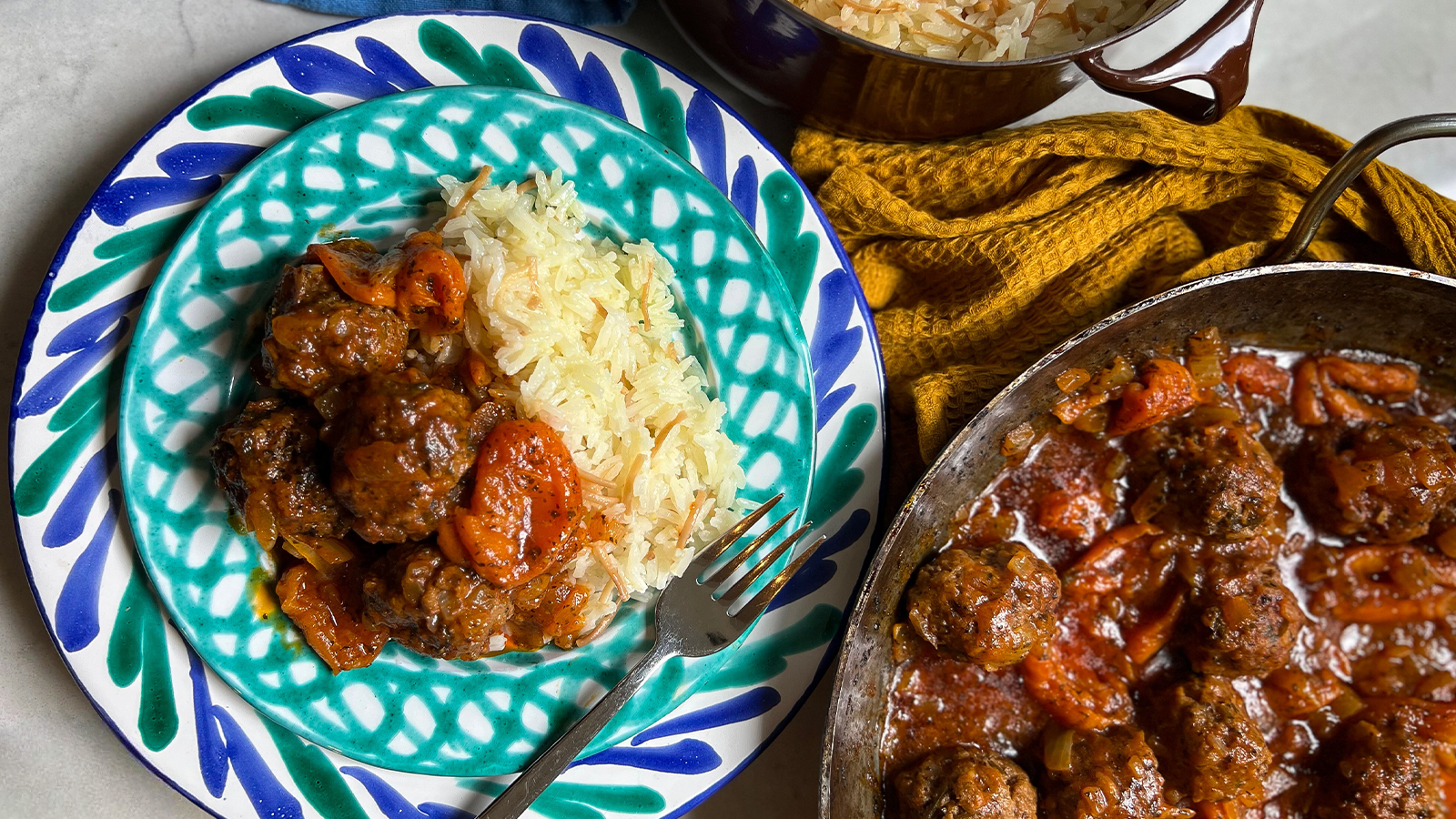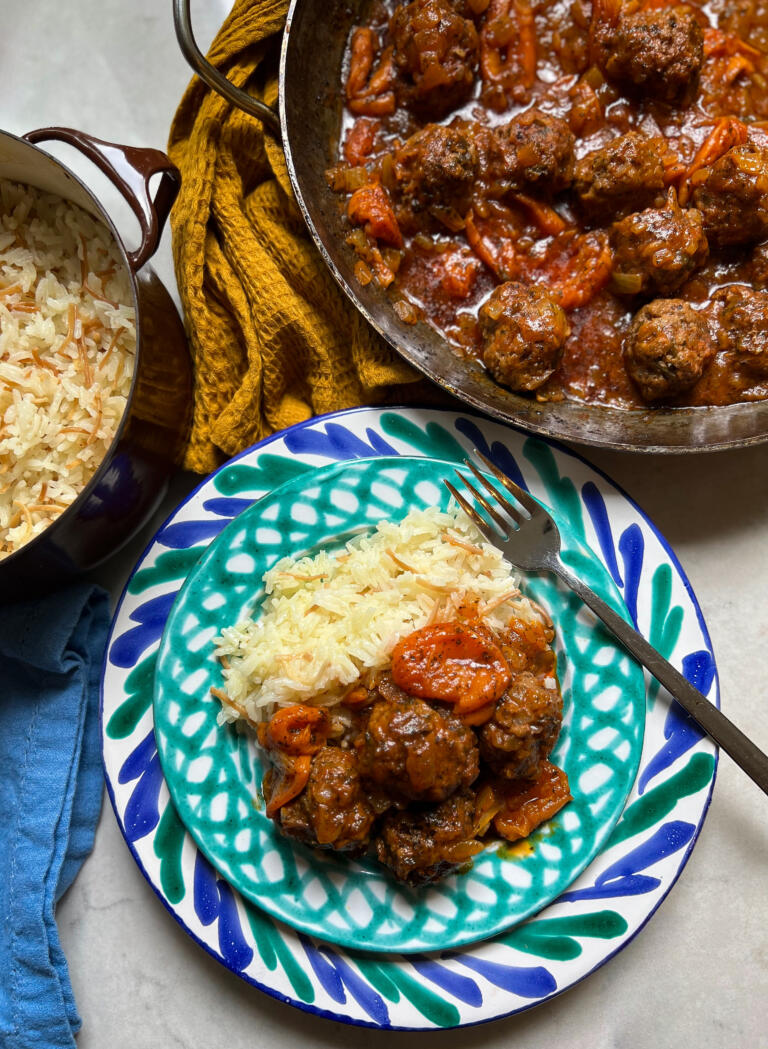My great-aunt Victoria (Toya) Levy was an incredible woman. Born in Baghdad in 1922, she moved to Israel with her husband in 1950 to start a new life. They lived in a tiny house surrounded by fruit trees that they planted in the small town of Yavneh, where Toya dedicated her life to helping children from broken families.
She was an amazing cook — and a generous one, too. Shortly after we got married, my husband and I spent a day with her to learn the secrets of Iraqi Jewish cooking from the best.
That day, Toya taught us how to make t’beet, a Shabbat dish of stuffed chicken with rice cooked overnight, and kubbeh batata: potato fritters stuffed with ground beef. In her tiny kitchen, she also taught us to make meatballs in a dried apricot and tomato sauce. Of all the dishes, this was the only one that my grandmother never made and so I was not familiar with it. Yet its flavors stuck with me. The simple ingredients — sour dried apricots, tomato, lemon juice, raisins and just a few spices — somehow made a dish much greater than the sum of its parts. The meatballs were so tender and rich, and the sauce was sweet and sour, a combination that Iraqi Jews love.
My great-aunt Toya passed away years ago. I had somehow forgotten this wonderful recipe and when I tried to research the dish, I found different versions of it in almost every Iraqi and Iraqi Jewish cookbook I searched in. The dish was called mishmishiya or kofta mishmishiya (“mishmish” means apricot in both Arabic and Hebrew), ingryieh (a name that I saw only in a Jewish cookbook) or margat hamidh-Hilu. Interestingly, all the Jewish versions included meatballs, while Islamic recipes used stew meat. I assume this had to do with the cost of ingredients and the fact that most Jewish recipes were written by Iraqi Jews who moved to Israel, where stew meat was much more expensive than ground beef.
The Nosher celebrates the traditions and recipes that have brought Jews together for centuries. Donate today to keep The Nosher's stories and recipes accessible to all.
According to Nawal Nasrallah’s “Delights From the Garden of Eden,” which researches the ancient cuisine of Iraq, the roots of this stew can be traced back to the Babylonian and Assyrian days (19th-6th centuries B.C.). A similar recipe, called mishmishiya, is also documented in Al-Baghdadi’s book “Kitab al Tabikh” from Medieval Baghdad. It calls for fresh apricots of a sour variety. Back then, of course, tomatoes from the New World were not available and, in fact, the original mishmishiya was also known as the “white stew.” Since Jews were living in Iraq from the destruction of the First Temple in 586 B.C., I feel a real connection to this humble stew’s long history.
Of all the recipes I found, my great-aunt Toya’s version is the best. Her apricot meatballs have become a family favorite; the 2,000-year-old dish from worlds away lives on, now with our kids.
Dried apricots are available all year long, but I still think this dish is most suitable for a summer dinner. The apricots, with their bright color and flavor, mirror sunny summer days, not to mention the fact that this easy and fast recipe is perfect for those of us who want to spend as little time as possible over the stove when temperatures outside are soaring.
Notes:
- The recipe calls for dried apricots with no added sugar. They are available at specialty supermarkets such as Whole Foods and Trader Joe’s. If you’re using sweetened dried apricots, reduce the sugar in the sauce to 2 teaspoons.
- The original recipe included raisins in the sauce, which I chose to omit, but you can add those for extra sweetness.
- Store the cooked meatballs in a sealed container in the fridge for up to four days.
Iraqi Apricot Meatballs
There’s a reason this 2,000-year-old recipe is still popular today.
- Total Time: 1 hour
- Yield: Serves 4-6
Ingredients
For the meatballs:
- 1 lb ground beef
- 1 cup chopped Italian parsley
- 1 cup finely chopped yellow onion
- 1 tsp kosher salt
- ¼ tsp ground black pepper
- 2 slices of bread (like challah or ciabatta), crusts removed, soaked in water
For the sauce:
- ¼ cup olive oil
- 1 yellow onion, diced
- ¼ cup tomato paste
- 1 Tbsp dried mint or ¼ cup chopped fresh mint
- ¼ tsp ground cardamom
- 1 Tbsp sugar (see notes)
- 1 ½ tsp salt
- ⅛ tsp white pepper
- 1 ½ cups water, at room temperature
- 3 Tbsp lemon juice
- 1 tsp paprika
- 1 cup (4 oz.) unsweetened dried apricot (see notes)
- ¼ cup golden raisins (optional, I do not use)
- cooked rice, for serving
Instructions
- Start by making the meatballs: Put ground beef, parsley, onion, salt and pepper in a medium bowl. Squeeze water out of the bread, add to the beef and mix with your hands for a couple of minutes. Shape the mixture into 1½-inch meatballs and arrange on a tray. Set aside.
- Use a skillet or a pot that is wide enough to hold all the meatballs in one layer, if possible. Put the skillet on medium-high heat, add olive oil, and when oil is hot, add onion and sauté until golden, about 6 minutes. Add tomato paste, mint, cardamom, sugar, salt and white pepper, mix and cook for another minute. Add water, lemon juice and paprika and bring to boil, then reduce the heat and cook on low simmer for 5 minutes. Taste sauce and adjust salt and sugar to taste.
- Add meatballs to the skillet and spoon sauce over them. Scatter the apricots and raisins (if using) between the meatballs. Bring back to a boil on medium-high heat, then reduce heat to a low simmer (you want to see small bubbles forming in the sauce), cover and cook for 15 minutes. Gently flip the meatballs and cook for another 15 minutes until the meatballs are cooked through.
- Serve over rice.
Notes
- The recipe calls for dried apricots with no added sugar. They are available at specialty supermarkets such as Whole Foods and Trader Joe’s. If you’re using sweetened dried apricots, reduce the sugar in the sauce to 2 tsp.
- The original recipe included raisins in the sauce, which I chose to omit, but you can add those for extra sweetness.
- Store the cooked meatballs in a sealed container in the fridge for up to four days.
- Prep Time: 30 minutes
- Cook Time: 30 minutes
- Category: Dinner
- Method: One-Pot
- Cuisine: Sephardic





I made this with ground turkey meatballs and was short on lemons so I used red wine vinegar, but it was delicious despite my changes.
I’m planning to do the same. Thanks
Sounds delicious
Sounds and looks delicious.
I really will have to make some
This has quickly become a family favorite! I’ve made it several times now (in the height of summer I use all mint in lieu of the parsley because I have an abundance of mint in my garden). I’ve also made it using ground chicken rather than beef. Absolutely delicious!
Has anyone tried making this with a meat substitute such as Beyond Meat? It sounds delicious.
yes and they’re delicious
Do you happen to have the nutritional breakdown of this recipe? It sounds delicious but I have to watch carbs, salt and sugar. Thanks!
Sorry Sharon, we do not.
Sharon if you enter the recipe into All Recipes (Allrecipes.com) it will do the nutrition for you. You can put it in as you plan to use it and adjust as necessary, then save it as your personal recipe.
Yummm
I made these for Passover using ground lamb and they were fabulous. Everyone loved them. Definitely going to be keeping this recipe and making them again.
I’m wheat-free. Can I use mashed potatoes in lieu of the bread?
You could! Or you could try gluten-free matzah.
Hi Myrna, I am also gluten free. Canyon Bakery (Sprouts or Costco) makes a gluten free bread or in Phoenix I found a local gluten free bakery. You can use Canyon Bakery bread (or the best gluten free bread that resembles cholla or white bread) that you can find and substitute that.
What about using fresh apricots??
Fantastic! We served these to an Iraqi friend and he loved them! We used 1/2 lamb and 1/2 beef and doubled the recipe.
I made this recipe tonight and it came out really delicious. I did add extra tomato paste and lemon juice and water because the sauce was getting a little thick and there wasn’t enough.
I am an Iraqi Jew and made this yesterday.
I added 1/4 tsp hawaj to the meatballs and used passata instead of the tomato paste.
My grandchildren said it was the best ever.
I left out the apricots and raisins for them.
Could I use fresh apricots instead? My granddaughter doesn’t like dried fruit (of any kind) but does like fresh fruit.
Sure! If you can find smaller, sour apricots, even better! Just note that they will have a very different texture to dried apricots — though still be as delicious and authentic.
Thanks for the recipe. I have one question to clarify. At first the recipe seems to instruct the chef to add the onion to the ground beef. But then it says to sauté the onion until golden. This is confusing. What is the correct process for the onion?
Thank you!
There are onions in both the meatballs and the sauce (see: Ingredients). So both are correct!
Is the measurement for parsley, a loosely packed cup of packed?
Thanks.
Haven’t tried this yet. Wanted to make sure if the measurements.
Loosely packed is fine, or pack it tighter if you love parsley. This type of recipe is very flexible!
Looking forward to making these! Can I bake instead? I’m doubling recipe and don’t really want to cook in two batches over the stove, but also want them to turn out right.
We’d recommend following the recipe as is for best results.
I’m wanting to do the same thing, did it work?